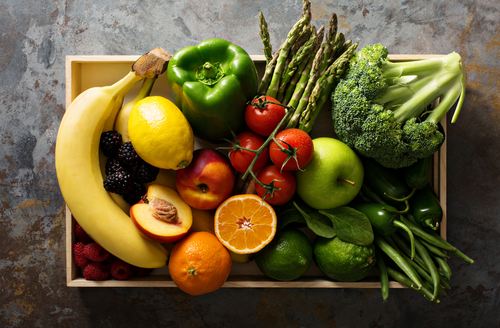We all want to do the best we possibly can for our families. Many of us want to buy organic food, but the cost is prohibiting us from doing so. Purchasing organic food may also be important to you to help protect the environment or for animal welfare reasons. Maybe you want to reduce your exposure to pesticides and GMOs. Whatever your reason for wanting to purchase organic food, the fact still remains that buying organic can be pricey! You may feel that it’s just not feasible for your family. Worry not! Here are 10 tips that will help you purchase organic food on a budget.
10 Tips for Buying Organic on a Budget
Shop at Your Local Farmer’s Market
Prices of organic produce and other food may be cheaper at the Farmer’s Market versus the grocery store. Purchasing locally grown food also ensures a higher nutrient value as the food does not have to travel long distances to reach a store. Try arriving late to the market as some vendors may discount prices near the end of the day to avoid bringing produce back to their farm.
Consume Less Animal Products
Meat and dairy are expensive and they are important to purchase organic because of the combined risk of pesticides, antibiotics and growth hormones in non-organic animal products. Try spending the same amount on organic meat and dairy that you would typically have spent on the non-organic versions. You will get a little less but won’t be increasing the cost of animal products you buy. Increase the amount of vegetables you purchase instead of buying more meat and dairy.
Shop Seasonally
Purchasing fruits such as strawberries in the middle of winter usually come with an increased price tag because they aren’t in season. Produce is cheaper when in season because it hasn’t been shipped a long distance and it is also more abundant. If you shop seasonally, you will definitely save money.
Stick to the “Clean 15”
Each year, the Environmental Working Group (EWG) produces a guide for shoppers showcasing the “Dirty Dozen” and “Clean 15”. These lists are composed of the twelve fruits and vegetables that tested highest for pesticide residue as well as the fifteen that tested the lowest. If you are very concerned about pesticides on your produce and cannot afford to buy organic, you may decide to stick to the “Clean 15” list and only purchase those fruits and vegetables.
Skip Pre-Washed or Pre-Cut Produce
These simply have a higher price tag due to the fact that someone has done the work of washing and cutting for you. If you wash and cut your own produce, you will save money.
Use Frozen Organic Produce
These can be cheaper than buying fresh especially if you need to purchase something that is out of season and because they are flash frozen soon after harvesting, they maintain all of their nutrients. Be sure to compare pricing between the fresh and frozen section!
Meal Plan to Avoid Waste
Write out your meals on a weekly or biweekly basis and use them to construct your grocery list. Then, stick to the list when shopping. This helps to avoid purchasing too much which will lead to more waste and it also helps to minimize purchases that aren’t necessary.
Shop the Sales
Check the fliers for the stores in your area and see what deals are on. You can base your meal plans around what is on sale that week which will definitely leave some dollars in your pocket.
Cook From Scratch
Avoid pre-packaged organic foods as they will typically be higher in price. Cooking or baking your own versions from scratch will be cheaper.
Grow Your Own Produce
Growing as much of your own produce as possible will save lots of money and you will be certain no pesticides were used. If you don’t have space outside for a full garden, even growing just some herbs on your windowsill can help you save.
Bonus tip: Reduce eating out as much as possible. It is much cheaper to prepare organic meals at home than to eat out at restaurants serving organic meals.
Please keep in mind that if buying organic just isn’t in your budget, it is still much better to include many fruits and vegetables in your diet versus not buying them at all. The benefits of including plenty of plant-based foods far outweigh the risks of purchasing conventionally grown produce. Don’t feel bad if you cannot buy everything organic and don’t be afraid to buy conventionally grown foods. If organic is just not doable for your family, know that you are still feeding your family nutritious meals made with love and that’s what matters most!


